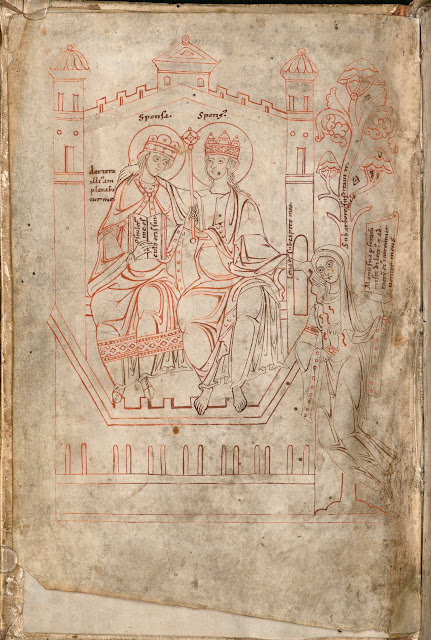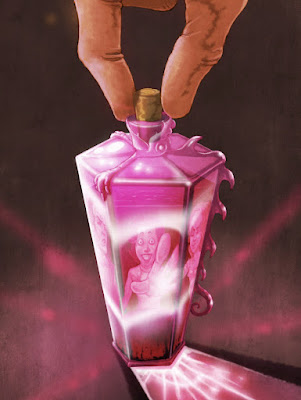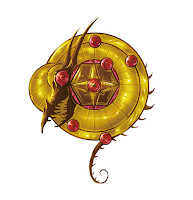Draco Layer Four: The Anagogic or Mystical Sense
Here be dragons. And doves.
Human beings long for transcendence. Such longing is, for the world, always out of fashion because, of course, it is not a longing for the world, and the world knows it.
We know what the world wants. The world—by which we mean Satan, the Lord of the World—wants above all our obedience, a jewel so precious that he will do anything to get it: lie, steal, murder, bear false witness, pretend to social standing, pretend to insider knowledge to get us to consent to his influence.
“God lied to you. You will not die.”
And suddenly we are anxious about having other people dislike us, about losing prestige in our social circles, about other people being more popular or influential or successful, about other people having secret knowledge, about our own influence and fame.
“You shall be as gods, knowing good and evil.”
And with that temptation, our first parents fell. The irony is cosmic. There they were in the Garden, privy to conversation with God face-to-face, and in the flick of the serpent’s tongue, they lost all of it: the beauty of the Garden, the face-to-face conversation with God, their own innocence and harmony as two in one flesh.
That temptation is with us to this day.
And yet nothing satisfies. Not the followers or the fame, not the illusion of knowledge or access to secret truths. And so we seek transcendence elsewhere, in control over our bodies through surgery or drugs; in the manipulation of our mood through sugar and yet more drugs; in the control of other people through, you guessed it, drugs.
“And why not?” you say. “Why shouldn’t I ease my pain from the incoherence and stupidity of the world by eating this apple (or cake)? Why shouldn’t I put goggles on and immerse myself in the ecstasy of a digital Xanadu? And who are you to say that the influencer whose merch I buy isn’t selling snake oil—isn’t that just what a snake oil salesman would say?”
Our Creator sees us succumbing to the Dragon—and weeps.
WWJD?
He knows he cannot break our addiction to the Dragon simply by demanding our obedience, even though, as our Creator, it is his to command. He does not want us as slaves, or even simply as willing servants; he wants us, all of humanity, as his bride, whom he made not for domination, but for love.
And yet, we turned from him and whored ourselves out to the Dragon because the Dragon promised us alchemical bliss.
It is quite the fairy tale, when you think about it. A lost bride, hated by an evil stepmother who prided herself on her beauty and status, is sent out into the world to be eaten by wild beasts and deprived of her groom. Unbeknownst to her, her prince watches over her, and sends her helpers to comfort her—prophets and patriarchs to take care of her until he returns—but even so she falls under the influence of the evil queen, who tempts her with potions and technology that the queen claims will ensure her beauty, knowledge, and fame. The bride dies, but her bridegroom has not forgotten her, and he returns at long last to raise her from the dead and welcome her to his throne—just as, in fact, Origen had predicted in his commentary on the Song of Songs. [1]
 |
| The Tale of the Bridegroom and his Bride, as told by Honorius Augustodunensis in his commentary on the Song of Songs Clm 4550 |
The world needs good stories. More accurately: Middle-earth needs the Gospel, the Good Story of God’s love for Creation, first told in English by Caedmon, retold for centuries in the liturgy of the Church, enacted on stage and retold yet again in movies every time there is a princess to be rescued from temptation, every time a prince declares his love for the peasant girl whom he raises up to be his bride.
It is also, by the by, why it is so irritating to see these stories rewritten so that the princess or peasant girl saves herself—not because there are no strong women in the Greatest Story Ever Told, but because we, addicts of the Dragon that we are, sense the lie. The human soul enslaved to sin cannot save itself, not with the potions of the apothecary, not with the technology of Mage. Tolkien realized this, which is why he gave Frodo Gollum to bite his finger off and fall into the fire. We are saved not by our own willing, but by grace—the grace of the Bridegroom who came forth into the world as a giant striding out upon the course of the sun (Psalm 18:6), only to be humiliated and despised as he emptied himself to die of love on the Cross.
This is not an easy story to know how to tell, and yet we tell it constantly. Over and over and over again, in our movies and fairy tales, the Knight comes to rescue the Princess from the Dragon; over and over and over again, the Maker of the Story enters into his tale, the Singer into his song, almost as if the Lord of Hosts wants our attention, even as we turn away and take another pill. In Draco Alchemicus, our hero enters into the Casino as yet another man, almost as if he has emptied himself of his divinity to risk his luck against the House.
One among the punters, he encounters the Dragon’s Queen. Will he be able to overcome her potions and rescue his bride?
Read on.
dragoncommonroom.com
[1] I give the deep lore on this tradition in From Judgment to Passion: Devotion to Christ and the Virgin Mary, 800-1200 (New York: Columbia University Press, 2002). I paraphrase above from Honorius’s version of the tale; see pp. 377-78.







Comments
Post a Comment
Thank you for taking the time to respond to my blog post. I look forward to hearing what you think!
F.B.